JUDGE AMY REEDY CAUGHT IN THE ACT OF HAND-PICKING JURORS?
by Sharon Rondeau

(Dec. 21, 2011) — On December 20, 2011, The Post & Email reported an eyewitness account of alleged jury-rigging performed by a Monroe County, TN judge while court employees looked on. The judge reportedly chose the people she wanted, allegedly collecting much personal data about those individuals who would serve on the 2012 grand juries and trial juries.
But why were they “chosen?” Why weren’t the names put into a box and pulled out blindly, as they do in other counties in the state? Why are the names and other personal information known to the judge?
The state laws of Tennessee are contained in the “Tennessee Code Annotated.” Laws regarding jury selection begin in Section 22, which is then subdivided. Section 22-2-301 states:
22-2-301. Automated selection of names for jury list.
(a) The jury coordinator in each county shall select names of prospective jurors to serve in the courts of that county by random automated means, without opportunity for the intervention of any human agency to select a particular name and in a manner that causes no prejudice to any person. The names, which shall constitute the jury list, shall be compiled from licensed driver records or lists, tax records or other available and reliable sources that are so tabulated and arranged that names can be selected by automated means. The jury coordinator may utilize a single source or any combination of sources. The jury coordinator is prohibited from using the permanent voter registration records as a source to compile the jury list.
(b) The jury coordinator shall repeat this procedure as often as reasonably necessary, but in no event may a list be retained for more than two (2) years. Prior to repeating this procedure and compiling a new jury list, no person may add to or take from the existing list, except as provided in this part.
(c) Notwithstanding the provisions of title 2, chapter 2, part 1 to the contrary, any voter registration form created on or after January 1, 2009, by the state coordinator of elections shall clearly state on the registration form the following: “Names of persons selected for jury service in state court are not chosen from permanent voter registration records.”
HISTORY: Acts 2008, ch. 1159, § 1.
Even if, in this electronic age, a county cannot utilize “automated means” as set forth above, the Tennessee legislature allows for an alternate method which stipulates that only the names of prospective jurors are recorded and kept in a box “securely locked and under seal.”
Following the computerized selection of potential jurors, the law stipulates that final selection of jurors will still be made “by automated means” in Section 22-2-304:
22-2-304. Automated selection of names for jury pool.
(a) In any county in this state where the names of prospective jurors are obtained by automated means pursuant to § 22-2-301, the selection of names of prospective jurors to be summoned shall likewise be made by automated means in such a manner as to assure proportionate distribution of names selected without opportunity for the intervention of any human agency to select a particular name and in a manner that causes no prejudice to any person. It is the duty of the presiding judge of the judicial district to notify the jury coordinator of the number of names to be selected from the jury list, and these names shall constitute the jury pool.
(b) When the required number of names have been selected for the jury pool, the jury coordinator shall place a list of those names in an envelope, and with the list shall be enclosed a report prepared and signed by the jury coordinator. A copy of the list and report shall be retained by the jury coordinator for use under the provisions of this chapter, and the report shall provide substantially as follows:
The link directly above displays the form mandated by state law to be used when the jurors have been selected and that the names be “enclosed.” Therefore, the judge does not have access to the names of the jurors. The form also states that the names have been drawn “according to law.”
There is also an alternate means of completing the final selection of jury names provided by law.
But Monroe County appears to not select the names according to the law.
If jurors are selected by “random automated means, without opportunity for the intervention of any human agency to select a particular name and in a manner that causes no prejudice to any person,” then how do the same jurors allegedly end up on grand juries and trial juries in Monroe County?
Why should the defendant have to ask if any of the jurors had served before within the 24-month period prohibited by the state law? Other Tennessee county court clerks have stated that if the computer is suspected of having made a mistake and chosen someone who had served too recently to be recalled to service, they compare the person’s information with their records and disqualify the individual if, in fact, he or she had served within the last 24 months.
So there is a way to check.
Monroe County collects more than enough information to determine whether or not the same person has been called within the prior 24-month period. That could have been done with Angela Davis. While Judge Jon Kerry Blackwood stated that there was no “proof” that the same “Angela Davis” had served prior to charges having been issued against Walter Francis Fitzpatrick, III in 2010 by a grand jury with a foreperson by that name, there should have been, based on the following evidence.
The Post & Email has received two packets of information, one of which contained juror instructions on Clerk Martha M. Cook’s personalized stationery:
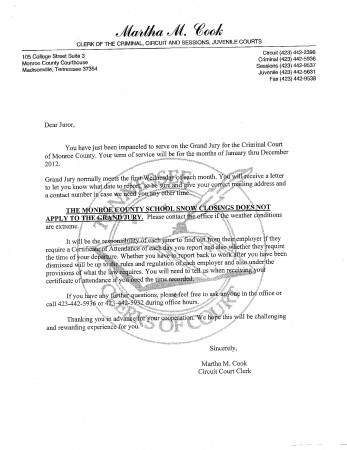
Page 1 begins:
Dear Juror,
You have just been impaneled to serve on the Grand Jury for the Criminal Court of Monroe County. Your term of service will be for the months of January thru December 2012.
It then goes on to say that jurors “will receive a letter” to advise them as to when to first report for service as well as providing phone numbers for anyone with questions.
Page 2 defines a grand jury and states that a jury trial is a “constitutional right.”
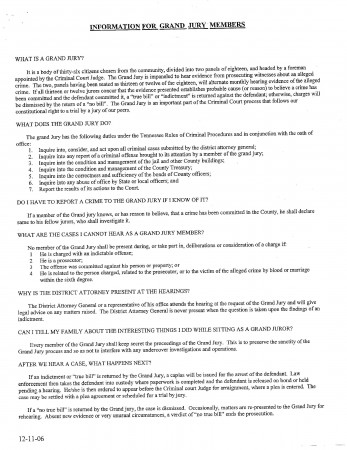
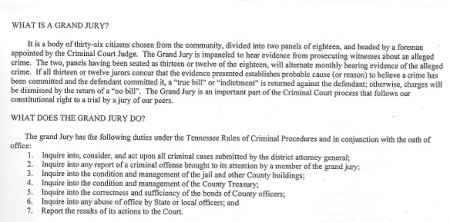
The second heading on page 2 is “WHAT DOES THE GRAND JURY DO?”
and the explanation reads:
The grand Jury has the following duties under the Tennessee Rules of Criminal Procedures and in conjunction with the oath of office:
1. Inquire into, consider, and act upon all criminal cases submitted by the district attorney general;
2. Inquire into any report of a criminal offense brought to its attention by a member of the grand jury;
3. Inquire into the condition and management of the jail and other County buildings;
4. Inquire into the condition and management of the County Treasury;
5. Inquire into the correctness and sufficiency of the bonds of County officers;
6. Inquire into any abuse of office by State or local officers; and
7. Report the results of its actions to the Court.
Has any Monroe County grand jury upheld its responsibilities that we know of? When was the last time any member inspected, or asked to inspect, the Monroe County jail?
Has any “grand jury” member reported “abuse” on the part of court personnel or judges?
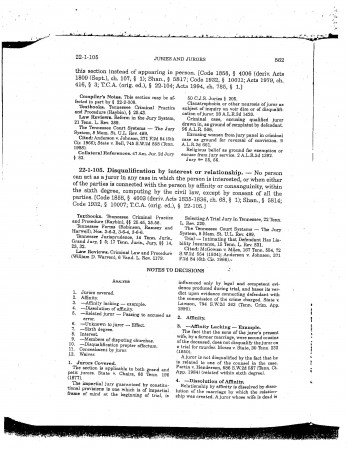
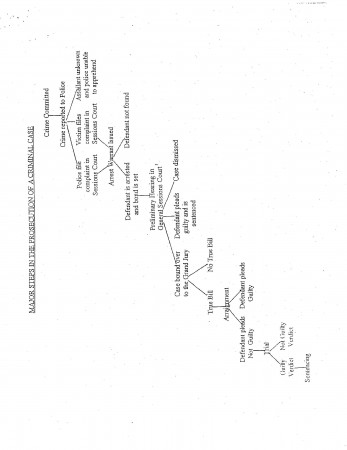
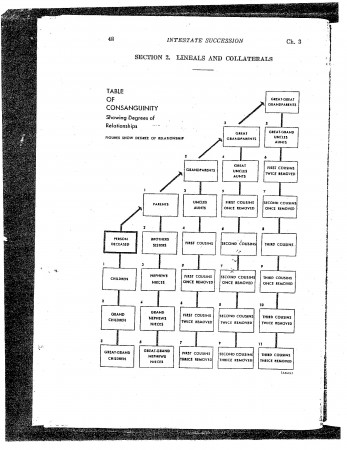
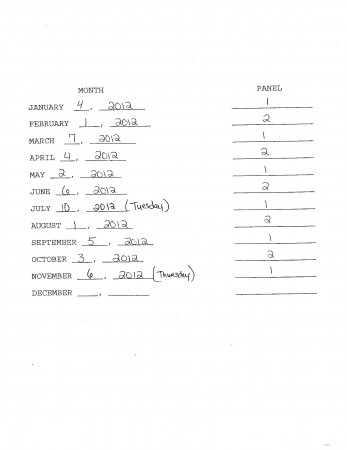
Included in the package were copies of a document entitled:
MONROE COUNTY CIRCUIT COURT
CERTIFICATE FO [SIC] ATTENDANCE FOR JURY DUTY
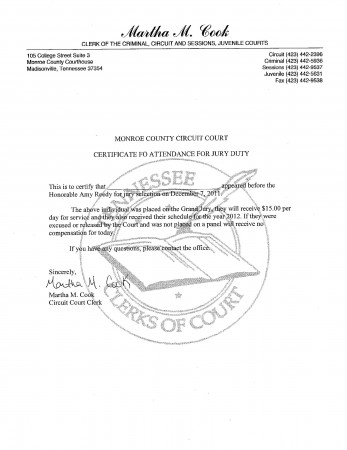
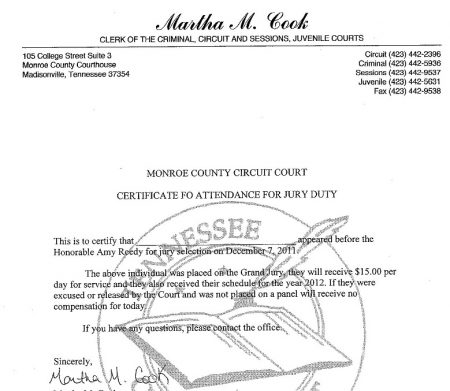
The first paragraph reads:
This is to certify that________________________________ appeared before the Honorable Amy Reedy for jury selection on December 7, 2011.
But the prospective jurors are not supposed to “appear” before the judge. Their names are supposed to be selected by “automated means” as stipulated in the law, without the involvement of a judge.
Other information received dealt with “Jury Service, Excused Absences & Compensation.”
Arriving in their own envelope were the following, except that all of the personal information was visible:
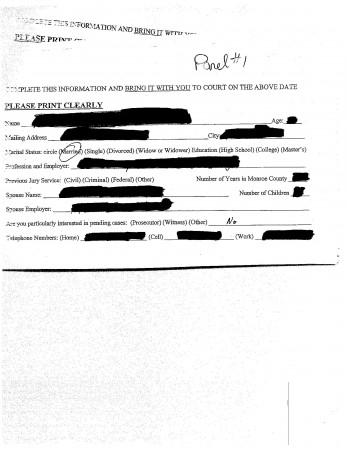
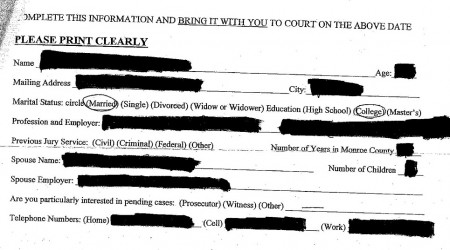
To the question “Are you particularly interested in pending cases?” no juror answered “yes.” It was either left blank, a “No” was supplied, a dash written in, and one person wrote “Any.”
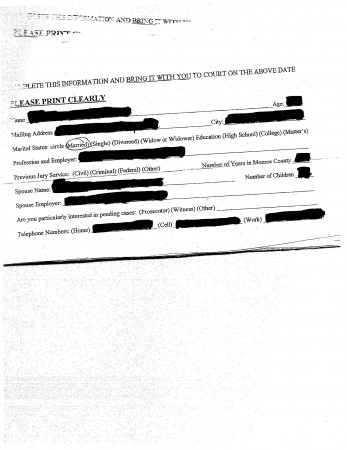
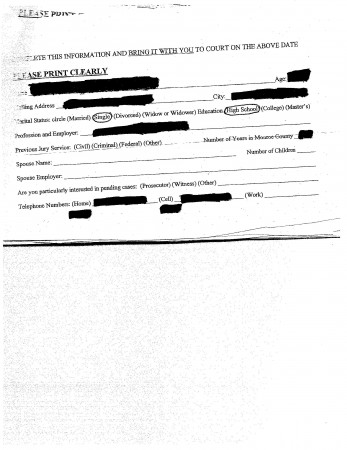
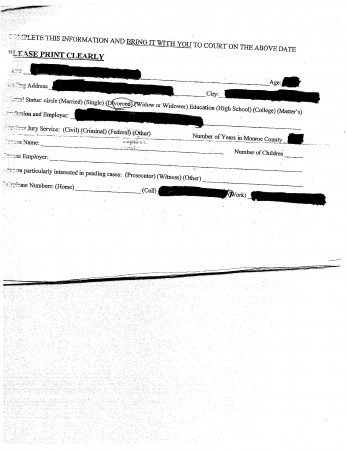 In total, there were 18 pieces of paper under the marking “Panel 1” and 18 pieces of paper under the designation “Panel 2.” For purposes of privacy, The Post & Email made copies of every piece of paper and blacked out the personal information.
In total, there were 18 pieces of paper under the marking “Panel 1” and 18 pieces of paper under the designation “Panel 2.” For purposes of privacy, The Post & Email made copies of every piece of paper and blacked out the personal information.
Based on the information which Monroe County apparently collects on each potential juror, it seems that it could have been easily determined whether or not the “Angela Davis” serving as foreman for one day in 2010 and who signed out an indictment against Fitzpatrick was the same as she who served in 2009. The judge stated that there was no proof, but there could have been.
If the indictments were issued by an illegal grand jury, then the prosecution of Fitzpatrick as a criminal, the injuries sustained, his time spent in jail, damage to his home, the seizing of his computer and equipment last week, and his current incarceration are all unlawful.
There was also the instance of the “repeat” juror on Fitzpatrick’s trial jury of December 1, 2010. If jury selection is done by automated means, why was he seated? Fortunately, in that instance, the error was corrected.
And what about the Monroe County grand jury foreman who was never sworn in?
Our local FBI office was not interested in seeing the evidence and deferred to the Knoxville, TN division, so we contacted them as well as the Tennessee Bureau of Investigation. Both agencies had been named as having been called upon to assist the Monroe County Sheriff’s Department in searching the home of Walter Francis Fitzpatrick, III, who was accused of “taking grand jury documents” after Clerk Martha Cook “noticed it was missing.”
From: Sharon Rondeau
Sent: Thu 12/15/11 8:53 PM
To: TBI Tipline (tipstotbi@tn.gov)
Cc: Knoxville FBI (knoxville@ic.fbi.gov)
WALTER FITZPATRICK/COURT DOCUMENTS
I might have information pertinent to the investigation reported on here http://www.wate.com/story/16221122/man-accused-of-interfering-again-with-monroe-county-grand-jury
regarding the above subject.
Sharon Rondeau
Editor
The Post & Email
www.thepostemail.com
203-987-7948
After receiving no response and wondering whether or not the Sheriff’s Department press release claiming their involvement was accurate, we sent a second message:
The following press release states that both of your agencies were asked to become involved in a recent charge against and arrest of Walter Francis Fitzpatrick, III.
http://www.wate.com/story/16221122/man-accused-of-interfering-again-with-monroe-county-grand-jury
I am specifically asking if the following two paragraphs are true:
“Detectives got warrants and sought help from the Tennessee Bureau of Investigation and the FBI to retrieve the documents.
The sheriff’s office says none of the agencies were able to make contact with Fitzpatrick or get the documents.”
Thank you very much.
Sharon Rondeau
Editor
The Post & Email
www.thepostemail.com
to which we received no response, hence this report.
The second paragraph of the WATE article, stated as having been obtained from the Monroe County Sheriff’s Department, is incorrect. Fitzpatrick did not seek the arrest of Gary Pettway because he “refused to indict President Obama for treason.” Rather, Fitzpatrick sought to arrest Pettway for serving at least 20 consecutive years in what he perceived as a violation of Tennessee Code Annotated and the Tennessee Rules of Criminal Procedure.
Did the Monroe County Sheriff’s Department really need assistance from the TBI and FBI? Are those two agencies involved at all? In Fitzpatrick’s letter, he mentioned only “Sheriff’s Department deputies.”
We have also been informed by members of the community that agents working at the Knoxville FBI have stated, or led them to believe, that they do not feel it is their responsibility to investigate judicial corruption in Tennessee. Why, then, would they have been involved in a search warrant for Fitzpatrick’s home? Why couldn’t the sheriff’s department handle it alone? Or did they?
The Monroe County grand juries for 2012 and in prior years appear to have been chosen with direct human intervention contrary to Tennessee state law.
Article I, Section 14 of the Tennessee Constitution states:
That no person shall be put to answer any criminal charge but by presentment, indictment or impeachment.
If the “indictment” is issued by a fake grand jury, then it, too, is fake. Trial juries containing jurors who have served within the 24-month period are not real juries.
If the foreman is a fake, then the entire “grand jury” is a fake, which means that every work product it puts forth is counterfeit.
How many citizens of Monroe County have been indicted, tried and spent jail time from such counterfeit proclamations?
Article I, Section 1 of the Tennessee Constitution reads:
That all power is inherent in the people, and all free governments are founded on their authority, and instituted for their peace, safety, and happiness; for the advancement of those ends they have at all times, an unalienable and indefeasible right to alter, reform, or abolish the government in such manner as they may think proper.
Who are the real criminals?
Citizens of Monroe County, how has your government served you?

What a joke state I live in. They won’t address real criminal behavior, but they have no problem disciplining a student that waved a piece of pizza, in the lunchroom, that some say looked like a gun.
Check it out here. http://www.wkrn.com/story/16325409/gun-shaped-pizza-slice
“Hopelessly corrupt” is how Attorney Steve Pigeon described it. I would agree with that sentiment.
What can be said that has not been said already. Can there truly be aliens without
conscience walking among us?